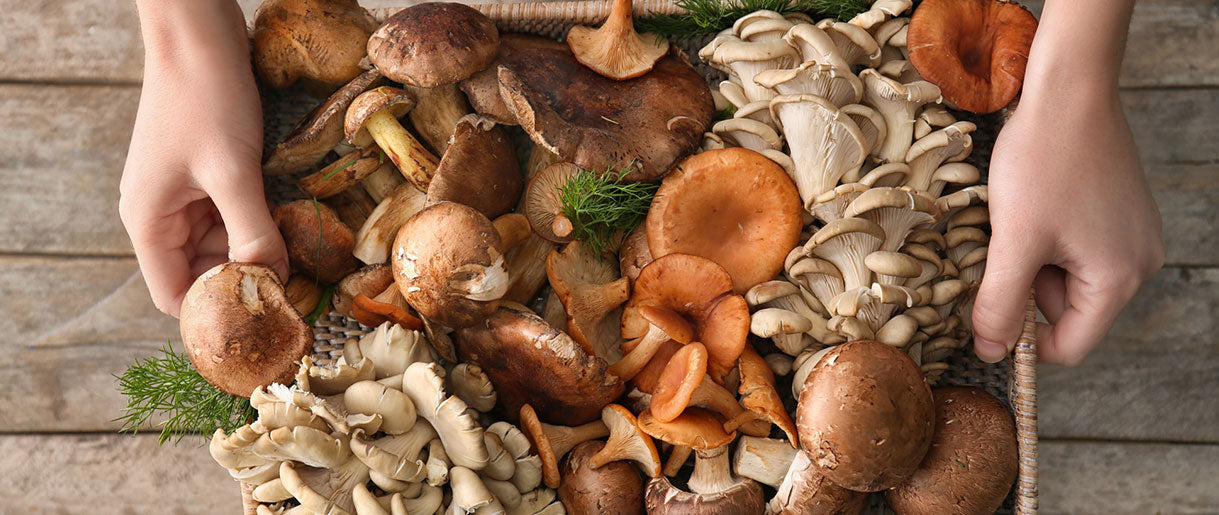Mushrooms have been recognized in traditional medicine for their diverse health benefits, including their potential to help reduce inflammation. Certain varieties of mushrooms contain bioactive compounds such as beta-glucans, ergothioneine, and others that exhibit anti-inflammatory properties. Notably, Lion's mane, Reishi, Chaga, Turkey Tail, Cordyceps, Maitake, and Shiitake mushrooms are renowned for combatting inflammation.
These medicinal mushrooms can be incorporated into your diet in various forms, including fresh, dried, powdered, or even as dietary supplements and teas. However, it's important to remember that while medicinal mushrooms can reduce inflammation, maintaining a balanced diet and lifestyle is also crucial.
So, how exactly do medicinal mushrooms act as a natural remedy for inflammation? Below, you will learn how consuming medicinal mushrooms helps you avoid symptoms of inflammation, including stiffness, pain, and swelling. In addition, you will see how medicinal mushrooms reduce the risk of inflammation-related diseases like inflammatory bowel diseases, arthritis, and cancer.
Inflammation: A Crucial Bodily Response

Inflammation is a crucial component of the body's defense mechanism. When the body detects harmful stimuli, such as bacteria, damaged cells, or irritants, it responds with a process known as inflammation to protect and heal the affected area. Essentially, it's a vital part of the immune system's response.
Understanding Acute vs. Chronic Inflammation
There are two primary types of inflammation: acute and chronic. Acute inflammation occurs immediately after injury or infection and is typically short-lived. It's characterized by increased blood flow, redness, heat, swelling, and pain. While often unpleasant, acute inflammation indicates that the immune system functions as it should.
On the other hand, chronic inflammation is long-term, persisting for months, sometimes years. Unlike acute inflammation, which serves a protective purpose, chronic inflammation can harm the body, leading to various diseases.
Chronic Inflammation: A Gateway to Disease
The connection between inflammation and diseases has been widely studied in animal models, leading to significant insights into the health-promoting benefits of anti-inflammatory interventions. For instance, regular monitoring and management of blood pressure are crucial, considering that chronic inflammation has been shown to affect blood pressure negatively.
Moreover, research has connected chronic inflammation to different types of cancer. For example, a research study conducted in 2021(1) confirmed that chronic inflammation is a significant component of breast cancer. Moreover, a research study conducted in 2019(2) showed that inflammation is a risk factor for diabetes.
Medicinal Mushrooms: Powerhouses of Bioactive Compounds
Medicinal mushrooms have long been utilized in alternative medicine and integrative medicine due to their diverse beneficial properties. These properties of edible mushrooms primarily come from bioactive components, such as beta-glucans and ergothioneine, that exhibit potent anti-inflammatory activities.
Beta-glucans, a polysaccharide found in edible mushrooms, are known for their ability to modulate the immune response, helping the body fight against diseases. Ergothioneine, another bioactive component, is an antioxidant that helps protect cells in the body from damage.
In addition to beta-glucans and ergothioneine, edible mushrooms also contain phenolic compounds, another group of bioactive compounds. These phenolic compounds also contribute to the anti-inflammatory activity of mushrooms.
Unlocking The Benefits Through Various Forms
Whether consuming mushrooms as a dietary supplement or integrating mushroom extracts into your meals, the bioactive compounds in these functional foods work actively to reduce inflammation in the body. Mushroom species, such as the Chaga mushroom, are primarily known for their rich content of these beneficial compounds.
In the following section, we will take a deeper look at how the medicinal properties of edible mushrooms help fight inflammation. Then, read on to see why more people are consuming mushrooms for inflammation.
Top 7 Mushrooms For Inflammation and Their Benefits
Mushrooms have been used extensively for thousands of years due to their nutritional and medicinal value. According to recent studies(3), edible mushroom extracts have positive therapeutic and health-promoting effects, especially in the case of diseases linked to inflammation.
The phenolic and indolic compounds, polysaccharides, mycosteroids, carotenoids, vitamins, fatty acids, and biometals are just a few of the anti-inflammatory substances abundant in mushrooms.
Below we will unearth the scientific evidence of the anti-inflammatory potential of different medicinal mushrooms. Let's see the best seven fungi that help fight inflammatory diseases like arthritis, different cancers, etc.
1. Lion's Mane

Hericium erinaceus, or Lion's mane mushroom, is renowned for its brain-boosting effects but has also been shown to possess anti-inflammatory properties.
Fights Obesity-Related Inflammation
Lion's Mane promotes weight loss—for this reason, its anti-inflammatory effects have been demonstrated on fatty tissues. For example, in a study(4), the mushroom extract significantly suppressed interleukin (IL)-6 and tumor necrosis factor (TNF)-α production, two inflammation-causing compounds. The mushroom, therefore, can fight obesity-related chronic low-grade inflammation in the adipose tissue, a primary initiator of metabolic diseases.
Research conducted in 2022(5) showed that low-grade inflammation is a leading cause of type 2 diabetes, especially in obese people. Interestingly, Lion's Mane fights diabetes, improving the body's ability to regulate blood sugar levels.
Eliminates Gut Inflammation
Lion's mane mushroom polysaccharides function as probiotics. It strengthens the host immune system and encourages the growth of beneficial bacteria.
These results(6) have been shown in animals with inflammatory bowel diseases (IBD), where the mushroom extracts have led to clinical improvements. In addition, lion's mane mushroom extract is also linked to a lower incidence of colon inflammation and indigestion.
Wages War Against Brain Inflammation
Inflammation in the brain is linked to neurodegenerative diseases like Alzheimer's and Parkinson's. In this 2019 study(7), the extracts of Lion's Mane showed potent neuroprotective activity, and results indicated an anti-inflammatory action. These findings demonstrated Lion's Mane might be a potential neuroprotective and anti-inflammatory agent in the brain.
2. Reishi

Another medicinal mushroom that has anti-inflammatory potential is Reishi or Ganoderma lucidum. It has antioxidants and other anti-inflammatory components, and studies(8) have also shown Reishi helps alleviate asthma symptoms.
Effective Treatment For Airway Inflammation
One of the leading causes of asthma is chronic airway inflammation. Interestingly, research has shown that(9) reishi mushroom extracts can help fight asthma. For example, an herbal remedy containing 62.5% Reishi mushroom in adults with asthma was well-tolerated and safe.
This Reishi dietary supplement helps people with asthma breathe more easily and thus strengthens their respiratory systems. Additionally, it was discovered that Reishi mushroom was just as successful at controlling asthma as systemic steroids.In addition to fighting asthma, Reishi also fights other Allergies because of its anti-inflammatory activity.
Fights Bowel Inflammation
In one study(10), active compounds found in Reishi (Triterpene ganoderic acid) decreased TNF-α production and other proinflammatory proteins in people with Inflammatory Bowel Disease. It also inhibited the mucosal inflammatory pathways implicated in the development of the disease. This study suggests that Reishi is one of the best mushrooms for boosting gut health.
Improves Skin Inflammation
Eczema, or dermatitis, is another chronic inflammatory skin condition affecting millions worldwide. Reishi mushrooms have the potential to help with eczema because they have been shown to improve immunity and reduce inflammation.
In one study(11), researchers determined that Reishi mushroom effectively treated severe atopic dermatitis (ADE), relieving disease symptoms in the study subjects.
3. Chaga Mushrooms

Chaga (Inonotus Obliquus) is rich in bioactive compounds, including polysaccharides, triterpenoids, and betulinic acid. These compounds have anti-inflammatory properties. Chaga mushrooms may reduce inflammation by modulating the immune system, reducing oxidative stress, and inhibiting inflammatory pathways.
Stimulates Production Of Anti-Inflammatory Molecules
Chaga mushroom stimulates cytokine production(12), vital molecules with anti-inflammatory effects. As a result, the edible mushroom can fight several inflammatory diseases like colitis, breast cancer, and high blood pressure.
In a study(13), oral administration of Chaga mushrooms ameliorated acute inflammation in mice with colitis. In addition, Chaga extracts suppressed tissue swelling and mucosal damage and markedly decreased the levels of inflammatory markers.
Fights Histamine To Reduce Microvascular Inflammation
The phenolic compounds in the fruit bodies of Inonotus obliquus were discovered to reduce histamine's ability to cause microvascular inflammation in an animal experiment conducted in 2019(14).
On a microvascular level, inflammation can impair cell-to-cell communication and, if left unchecked, may even result in cardiovascular diseases. However, several ingredients in this delectable, edible mushroom seem to reduce microvascular inflammation.
Interesting Read: See all the benefits of Chaga mushrooms.
4. Turkey Tail

Traditional uses of Turkey tail mushrooms or Trametes versicolor include treating(15) inflammatory diseases such as rheumatoid arthritis, hepatitis, and airway inflammation (bronchitis). The mushroom, therefore, is a potent anti-inflammatory agent.
Turkey Tail Is Rich In Anti-Inflammatory Compounds
The Turkey tail mushroom inflammation benefits were explored in this 2018 study(16). The fungus is rich in bioactive substances like triterpenoids, phenols, and sterols that have been shown to inhibit both the inflammation process and the chemicals that trigger it.
It has been demonstrated that the mushroom's mycelium significantly increases the proinflammatory cytokines, which the body uses to fight inflammation. In addition, the Turkey tail mushroom was also said to produce virus-fighting chemicals, according to the same study.
Turkey Tail Fights Joint Inflammation
One study(17) described how polysaccharide krestin isolated from Turkey tail mushrooms treats rheumatoid arthritis (RA). The foot diameters of six groups of male Wistar rats were measured with calipers. The findings revealed a noticeable reduction in foot diameter.
5. Cordyceps Sinensis & Militaris

Cordyceps sinensis and militaris contain bioactive compounds that have anti-inflammatory properties. These bioactive compounds include cordycepin, polysaccharides, and ergosterol.
Fights Joint Inflammation Associated With Arthritis
In this 2019 study(18), researchers discovered that cordycepin decreased joint pathology, synovial inflammation, and pain behavior in rats and people with rheumatoid arthritis.
Another study(19) looked into the effects of cordycepin on rheumatoid arthritis (RA). Results showed that cordycepin inhibited inflammatory markers associated with arthritis. This suggests that the active components in cordyceps sinensis can effectively fight symptoms of arthritis, including joint pain, swelling, and stiffness.
Fights Airway Inflammation
Cordyceps has been traditionally used to support lung function and may be beneficial for people with respiratory conditions that involve inflammation, such as asthma or chronic obstructive pulmonary disease (COPD).
One study(20) determined that Cordyceps improves lung health, playing a protective role in lung fibrosis by fighting inflammation. Another study confirmed(21) that the mushroom effectively fights airway inflammation, acting as a natural remedy for COPD.
6. Maitake

Maitake or Grifola frondosa is also one of the best mushrooms for inflammation. Research suggests that maitake mushrooms contain various bioactive compounds, such as beta-glucans and ergothioneine. These compounds may have anti-inflammatory effects by modulating the immune system and reducing the production of proinflammatory molecules in the body.
Maitake Fights Hepatitis Inflammation
In a 2021 experiment on animals(22), the effect of a maitake mushroom extract on hepatitis-related inflammatory processes was investigated. Results indicate that maitake mushrooms have anti-inflammatory properties because the mice who received them had lower levels of inflammation than the control group.
Bioactive Components In Maitake Reduce Inflammation
The anti-inflammatory properties of o-orsellinaldehyde, a naturally occurring substance found in the superfood Grifola frondosa, were investigated in a 2021 study(23). The results demonstrated that o-orsellinaldehyde is one of the most effective inflammatory mediators that significantly inhibits the inflammatory responses in astrocytes and microglia. Additionally, o-orsellinaldehyde prevents NF-B (an inflammatory marker) activation in microglia cells.
Interesting Read: See all the benefits of maitake mushrooms.
7. Shiitake Mushrooms

Shiitake mushroom species are known for their potential anti-inflammatory properties. Modern research shows they contain various compounds, including polysaccharides, beta-glucans (β-glucan), and ergothioneine. These compounds have been studied for their potential effects on reducing inflammation.
Fights Tumor-Related Inflammation
Shiitake mushrooms have a bioactive compound called Lentinan, which has been studied for its potential ability to exert anti-tumor effects. Studies have shown(24) Lentinan stimulates the immune function, enhances the production of natural killer cells and T-cells, and reduces inflammation in the body.
Some studies have suggested that Lentinan may help fight the growth of cancer cells, particularly in patients with certain types of cancer, such as breast, stomach, and colorectal cancer, suggesting Shiitake could work as an alternative medicine for cancer treatment.
Shiitake Modulates The Immune System
Research has shown(25) that Shiitake mushrooms are effective immune system modulators. Modulating the immune system can help fight inflammation by regulating the body's immune response and reducing the production of proinflammatory molecules.
How to Harness the Power of Medicinal Mushrooms for Inflammation Treatment

To avail of the health benefits of medicinal mushrooms, one must incorporate them into their diet in various ways. Many options exist, from the wild mushrooms foraged from the forest to the diverse array of mushrooms available in local markets.
Mushroom Consumption: Fresh, Dried, Powdered, and More
Fresh mushrooms are a staple in many culinary dishes and can be an excellent addition to stir-fries, soups, and salads. For example, you can leverage Lion's mane mushroom recipes to prepare a healthy meal at home.
Dried mushrooms are a good choice for those who prefer convenience or want to store medicinal mushrooms longer. They can be rehydrated quickly and add a depth of flavor to any dish.
Dietary supplements are available in capsules or tablets for a quick and easy intake of medicinal mushrooms. This is an efficient way for those who might not enjoy the taste of mushrooms but still want to take advantage of their health benefits.
In addition, mushroom powder can be an effective way of adding a nutrient boost to your meals. This can be sprinkled onto dishes or blended into smoothies.
Mushroom Teas and Delicious Recipes
Another method of consumption is through mushroom teas, made by steeping dried or powdered mushrooms in hot water. This can serve as a calming and nutritious beverage.
If you're looking for easy and delicious mushroom-based recipes, consider trying a medicinal mushroom stir-fry, a mushroom soup enriched with a blend of medicinal mushrooms, or a simple grilled mushroom side dish. Even incorporating mushrooms into a pasta sauce or a risotto can make for a flavorful and healthful meal.
Precautions and Potential Side Effects
While incorporating medicinal mushrooms into your diet, you must be aware of potential side effects and precautions. Not all mushrooms are safe to consume, and even edible mushrooms can cause allergic reactions in some people. Therefore, starting with small quantities is advisable to monitor for adverse reactions.
If you're foraging for wild mushrooms, it's crucial to accurately identify the species, as some can be toxic and potentially lethal. Always consult with an expert if you're unsure.
As with all dietary supplements, medicinal mushroom supplements should be used cautiously. They can interact with certain medications and may not be suitable for everyone, especially pregnant women, breastfeeding mothers, or people with certain medical conditions.
Interesting Read: Learn about Lion's mane drug interactions.
Lifestyle Factors: An Integral Role in Managing Inflammation

While incorporating foods like medicinal mushrooms into your diet can be a key element in managing inflammation, it is crucial to remember that overall lifestyle factors play an integral role in this process. Indeed, a balanced diet and lifestyle are fundamental in the fight against inflammation.
Balancing Diet: Eat Right to Fight Inflammation
A balanced diet should contain various foods, including fruits, vegetables, whole grains, lean proteins, and healthy fats. Limiting the intake of processed foods, sugars, and unhealthy fats can also significantly reduce inflammation.
Exercise: A Natural Anti-inflammatory
Exercise is a natural way to combat inflammation. In addition, regular physical activity encourages the production of anti-inflammatory substances in the body and helps maintain a healthy weight, which can also reduce inflammation. Aim for a mix of cardio, strength training, and flexibility exercises for a comprehensive approach.
Sleep: The Rejuvenating Factor
Quality sleep is another critical factor in managing inflammation. Sleep deprivation can cause a spike in inflammatory markers in the body, so ensuring you get 7-9 hours of sleep per night is essential for optimal health.
Stress Management: The Inflammation Regulator
Managing stress is also crucial, as chronic stress can trigger and exacerbate inflammation. Techniques such as meditation, yoga, deep breathing exercises, or simply engaging in activities you enjoy can help reduce stress levels.
Mushrooms for Inflammation Video
FAQs About Mushrooms For Inflammation
Which Mushroom Is Best For Inflammation?
Among the many types of mushrooms, Reishi, Shiitake, Maitake, Cordyceps, Lion's Mane, and Chaga have been found to have anti-inflammatory properties.
Reishi mushrooms, for example, contain a group of triterpenoids that have been found to have anti-inflammatory effects. On the other hand, Shiitake mushrooms contain a compound called ergothioneine, which is known for its antioxidant and anti-inflammatory effects. In addition, Maitake mushrooms have beta-glucans, a compound that has been found to have immune-boosting and anti-inflammatory properties.
Cordyceps mushrooms are known for their potent anti-inflammatory effects. Lion's Mane boasts anti-inflammatory and antioxidant properties. Chaga mushrooms have anti-inflammatory properties and are also believed to have immune-boosting effects.
Is Lion's Mane Good For Inflammation?
Lion's Mane mushrooms contain anti-inflammatory compounds, making them a potential natural remedy for inflammation. In addition, research has suggested that Lion's Mane mushrooms may help reduce inflammation by inhibiting the production of inflammatory molecules.
Specifically, Lion's Mane mushrooms contain compounds called polysaccharides and beta-glucans that have immune-boosting and anti-inflammatory properties. In addition, these compounds inhibit the production of chemicals that contribute to inflammation in the body.
Which Mushroom Is Best For Rheumatoid Arthritis?
Rheumatoid arthritis causes joint inflammation, leading to pain, stiffness, and swelling. While rheumatoid arthritis has no cure, research has found that several edible mushrooms have medicinal properties that may benefit people with this condition.
Reishi mushrooms, for example, may help reduce inflammation and pain associated with rheumatoid arthritis. In addition, Shiitake reduces the severity of rheumatoid arthritis symptoms.
Maitake mushrooms may also help reduce inflammation and improve joint health in people with rheumatoid arthritis. In addition, cordyceps mushrooms have anti-inflammatory and immunomodulatory effects, which may help reduce inflammation and pain associated with rheumatoid arthritis.
Key Takeaways
While acute inflammation is a normal bodily process, chronic inflammation increases the risk of cancer, arthritis, diabetes, and other diseases.
However, functional mushrooms such as Reishi, Lion's Mane, Turkey Tail, Chaga, Cordyceps, Shiitake, and Maitake can be a natural remedy for inflammation. Add the mushroom powder to water, juice, or your favorite snack to fight the pain, stiffness, swelling, and other symptoms associated with chronic inflammation.
However, if this is the first time you take mushrooms as a natural remedy to your chronic inflammation, talk to your doctor first. The doctor will help you determine the ideal dosage for these mushrooms, helping you avoid side effects and enjoy their significant anti-inflammatory effects.
Have you used mushrooms for inflammation? Which mushroom did you use? Was the mushroom an effective treatment for the symptoms of inflammation? Let us know in the comments.
References
- The Role of Chronic Inflammation in the Development of Breast Cancer, (1)https://pubmed.ncbi.nlm.nih.gov/34359821/
- The Role of Inflammation in Diabetes: Current Concepts and Future Perspectives, (2)https://www.ncbi.nlm.nih.gov/pmc/articles/PMC6523054/
- Anti-inflammatory properties of edible mushrooms: A review, (3)https://www.sciencedirect.com/science/article/abs/pii/S0308814617316205?via%3Dihub
- The Anti-Inflammatory Effects of Lion's Mane Culinary-Medicinal Mushroom, Hericium erinaceus (Higher Basidiomycetes) in a Coculture System of 3T3-L1 Adipocytes and RAW264 Macrophages, (4)https://pubmed.ncbi.nlm.nih.gov/26559695/
- Low-grade inflammation in type 2 diabetes: a cross-sectional study from a Danish diabetes outpatient clinic, (5)https://pubmed.ncbi.nlm.nih.gov/36517105/
- Extracts from Hericium erinaceus relieve inflammatory bowel disease by regulating immunity and gut microbiota, (6)https://www.ncbi.nlm.nih.gov/pmc/articles/PMC5689651/
- Lion's Mane Mushroom, Hericium erinaceus (Bull.: Fr.) Pers. Suppresses H2O2-Induced Oxidative Damage and LPS-Induced Inflammation in HT22 Hippocampal Neurons and BV2 Microglia, (7)https://www.ncbi.nlm.nih.gov/pmc/articles/PMC6720269/
- Safety and tolerability of an antiasthma herbal Formula (ASHMI) in adult subjects with asthma: a randomized, double-blinded, placebo-controlled, dose-escalation phase I study, (8)https://pubmed.ncbi.nlm.nih.gov/19586409/
- Ganoderma modulates allergic asthma pathologic features via anti-inflammatory effects, (9)https://pubmed.ncbi.nlm.nih.gov/35026480/
- Anti-inflammatory Effects of Ganoderma lucidum Triterpenoid in Human Crohn's Disease Associated with Downregulation of NF-κB Signaling, (10)https://academic.oup.com/ibdjournal/article/21/8/1918/4602954
- Useful Treatment of Severe Atopic Dermatitis with Ganoderma lucidum (Reishi): A Multiple-Case study, (11)https://www.semanticscholar.org/paper/Useful-Treatment-of-Severe-Atopic-Dermatitis-with-A-Michio-Masato/bd94d6a0b6867e4b5c1ef4fd5461e37b15f7ecf0
- Inonotus obliquus extracts suppress antigen-specific IgE production through the modulation of Th1/Th2 cytokines in ovalbumin-sensitized mice, (12)https://pubmed.ncbi.nlm.nih.gov/21820502/
- Orally administered aqueous extract of Inonotus obliquus ameliorates acute inflammation in dextran sulfate sodium (DSS)-induced colitis in mice, (13)https://pubmed.ncbi.nlm.nih.gov/22819687/
- Inonotus obliquus attenuates histamine-induced microvascular inflammation, (14)https://pubmed.ncbi.nlm.nih.gov/31437163/
- Anti-inflammatory activities of the chemical constituents isolated from Trametes versicolor, (15)https://pubmed.ncbi.nlm.nih.gov/29521529/
- The mycelium of the Trametes versicolor (Turkey tail) mushroom and its fermented substrate each show potent and complementary immune activating properties in vitro, (16)https://pubmed.ncbi.nlm.nih.gov/31791317/
- Effect of Polysaccharide Krestin on MMP3 Expression and Foot Diameter in Rheumatoid Arthritis in Rat, (17)https://www.researchgate.net/publication/339140201
- The polyadenylation inhibitor cordycepin reduces pain, inflammation and joint pathology in rodent models of osteoarthritis, (18)https://www.ncbi.nlm.nih.gov/pmc/articles/PMC6423048/
- Cordycepin inhibits IL-1β-induced MMP-1 and MMP-3 expression in rheumatoid arthritis synovial fibroblasts, (19)https://academic.oup.com/rheumatology/article/48/1/45/1790114
- Protective roles of Cordyceps on lung fibrosis in cellular and rat models, (20)https://www.ncbi.nlm.nih.gov/pmc/articles/PMC7125542/
- Cordyceps sinensis inhibits airway remodeling in rats with chronic obstructive pulmonary disease, (21)https://www.ncbi.nlm.nih.gov/pmc/articles/PMC5795554/
- Influence of thick extract from maitake mushrooms on signs of inflammatory process in experimental toxic hepatitis, (22)https://ojs.tdmu.edu.ua/index.php/ijmr/article/view/12100
- Anti-Inflammatory and Immunomodulatory Effects of the Grifola frondosa Natural Compound o-Orsellinaldehyde on LPS-Challenged Murine Primary Glial Cells. Roles of NF-κβ and MAPK, (23)https://www.ncbi.nlm.nih.gov/pmc/articles/PMC8229786
- Mushroom polysaccharide lentinan for treating different types of cancers: A review of 12 years clinical studies in China, (24)https://pubmed.ncbi.nlm.nih.gov/31030752/
- Consuming Lentinula edodes (Shiitake) Mushrooms Daily Improves Human Immunity: A Randomized Dietary Intervention in Healthy Young Adults, (25)https://pubmed.ncbi.nlm.nih.gov/25866155/










Let Us Know Your Comments